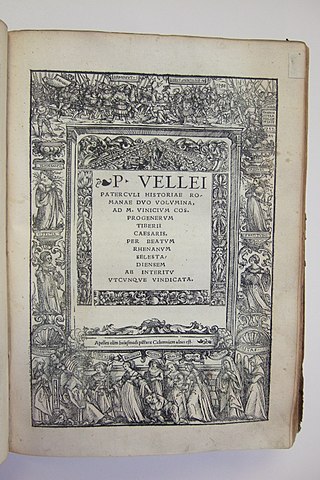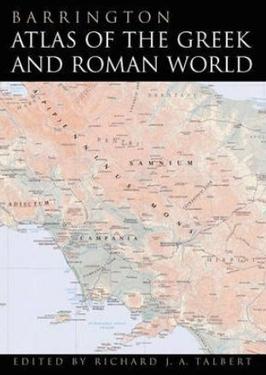Related Research Articles

The terms anno Domini (AD) and before Christ (BC) are used to label or number years in the Julian and Gregorian calendars. The term anno Domini is Medieval Latin and means 'in the year of the Lord', but is often presented using "our Lord" instead of "the Lord", taken from the full original phrase "anno Domini nostri Jesu Christi", which translates to 'in the year of our Lord Jesus Christ'. The form "BC" is specific to English and equivalent abbreviations are used in other languages: the Latin form is Ante Christum natum but is rarely seen.

Ares is the Greek god of war and courage. He is one of the Twelve Olympians, and the son of Zeus and Hera. The Greeks were ambivalent towards him. He embodies the physical valor necessary for success in war but can also personify sheer brutality and bloodlust, in contrast to his sister, the armored Athena, whose martial functions include military strategy and generalship. An association with Ares endows places, objects, and other deities with a savage, dangerous, or militarized quality.

The British Museum is a public museum dedicated to human history, art and culture located in the Bloomsbury area of London. Its permanent collection of eight million works is among the largest and most comprehensive in existence. It documents the story of human culture from its beginnings to the present. The British Museum was the first public national museum to cover all fields of knowledge.

The Great Library of Alexandria in Alexandria, Egypt, was one of the largest and most significant libraries of the ancient world. The Library was part of a larger research institution called the Mouseion, which was dedicated to the Muses, the nine goddesses of the arts. The idea of a universal library in Alexandria may have been proposed by Demetrius of Phalerum, an exiled Athenian statesman living in Alexandria, to Ptolemy I Soter, who may have established plans for the Library, but the Library itself was probably not built until the reign of his son Ptolemy II Philadelphus. The Library quickly acquired many papyrus scrolls, owing largely to the Ptolemaic kings' aggressive and well-funded policies for procuring texts. It is unknown precisely how many such scrolls were housed at any given time, but estimates range from 40,000 to 400,000 at its height.

Tamil is a Dravidian language natively spoken by the Tamil people of South Asia. Tamil is an official language of the Indian state of Tamil Nadu, the sovereign nations of Sri Lanka and Singapore, and the Indian territory of Puducherry. Tamil is also spoken by significant minorities in the four other South Indian states of Kerala, Karnataka, Andhra Pradesh and Telangana, and the Union Territory of the Andaman and Nicobar Islands. It is also spoken by the Tamil diaspora found in many countries, including Malaysia, Myanmar, South Africa, United Kingdom, United States, Canada, Australia and Mauritius. Tamil is also natively spoken by Sri Lankan Moors. One of 22 scheduled languages in the Constitution of India, Tamil was the first to be classified as a classical language of India.

Tiberius Julius Caesar Augustus was the second Roman emperor. He reigned from AD 14 until 37, succeeding his stepfather, the first Roman emperor Augustus. Tiberius was born in Rome in 42 BC. His father was the politician Tiberius Claudius Nero and his mother was Livia Drusilla, who would eventually divorce his father, and marry the future-emperor Augustus in 38 BC. Following the untimely deaths of Augustus' two grandsons and adopted heirs, Gaius and Lucius Caesar, Tiberius was designated Augustus' successor. Prior to this, Tiberius had proved himself an able diplomat, and one of the most successful Roman generals: his conquests of Pannonia, Dalmatia, Raetia, and (temporarily) parts of Germania laid the foundations for the empire's northern frontier.

Strabo was a Greek geographer, philosopher, and historian who lived in Asia Minor during the transitional period of the Roman Republic into the Roman Empire.

Ancient Greece was a northeastern Mediterranean civilization, existing from the Greek Dark Ages of the 12th–9th centuries BC to the end of classical antiquity, that comprised a loose collection of culturally and linguistically related city-states and other territories. Most of these regions were officially unified only once, for 13 years, under Alexander the Great's empire from 336 to 323 BC. In Western history, the era of classical antiquity was immediately followed by the Early Middle Ages and the Byzantine period.
In ancient Greek religion and mythology, Iacchus was a minor deity, of some cultic importance, particularly at Athens and Eleusis in connection with the Eleusinian mysteries, but without any significant mythology. He perhaps originated as the personification of the ritual exclamation Iacche! cried out during the Eleusinian procession from Athens to Eleusis. He was often identified with Dionysus, perhaps because of the resemblance of the names Iacchus and Bacchus, another name for Dionysus. By various accounts he was a son of Demeter, or a son of Persephone, identical with Dionysus Zagreus, or a son of Dionysus.

The Lernaean Hydra or Hydra of Lerna, more often known simply as the Hydra, is a serpentine water monster in Greek and Roman mythology. Its lair was the lake of Lerna in the Argolid, which was also the site of the myth of the Danaïdes. Lerna was reputed to be an entrance to the Underworld, and archaeology has established it as a sacred site older than Mycenaean Argos. In the canonical Hydra myth, the monster is killed by Heracles (Hercules) as the second of his Twelve Labors.

Diodorus Siculus, or Diodorus of Sicily, was an ancient Greek historian. He is known for writing the monumental universal history Bibliotheca historica, in forty books, fifteen of which survive intact, between 60 and 30 BC. The history is arranged in three parts. The first covers mythic history up to the destruction of Troy, arranged geographically, describing regions around the world from Egypt, India and Arabia to Europe. The second covers the time from the Trojan War to the death of Alexander the Great. The third covers the period to about 60 BC. Bibliotheca, meaning 'library', acknowledges that he was drawing on the work of many other authors.

Classical Latin is the form of Literary Latin recognized as a literary standard by writers of the late Roman Republic and early Roman Empire. It was used from 75 BC to the 3rd century AD, when it developed into Late Latin. In some later periods, it was regarded as good or proper Latin, with following versions viewed as debased, degenerate, or corrupted. The word Latin is now understood by default to mean "Classical Latin"; for example, modern Latin textbooks almost exclusively teach Classical Latin.

Lucius Cassius Dio, also known as Dio Cassius, was a Roman historian and senator of maternal Greek origin. He published 80 volumes of the history on ancient Rome, beginning with the arrival of Aeneas in Italy. The volumes documented the subsequent founding of Rome, the formation of the Republic, and the creation of the Empire, up until 229 AD. Written in Ancient Greek over 22 years, Dio's work covers approximately 1,000 years of history. Many of his 80 books have survived intact, or as fragments, providing modern scholars with a detailed perspective on Roman history.

Marcus Velleius Paterculus was a Roman historian, soldier and senator. His Roman history, written in a highly rhetorical style, covered the period from the end of the Trojan War to AD 30, but is most useful for the period from the death of Caesar in 44 BC to the death of Augustus in AD 14.

Ancient Greek literature is literature written in the Ancient Greek language from the earliest texts until the time of the Byzantine Empire. The earliest surviving works of ancient Greek literature, dating back to the early Archaic period, are the two epic poems the Iliad and the Odyssey, set in an idealized archaic past today identified as having some relation to the Mycenaean era. These two epics, along with the Homeric Hymns and the two poems of Hesiod, Theogony and Works and Days, constituted the major foundations of the Greek literary tradition that would continue into the Classical, Hellenistic, and Roman periods.

The work called Ab urbe condita, sometimes referred to as Ab urbe condita libri, is a monumental history of ancient Rome, written in Latin between 27 and 9 BC by Livy, a Roman historian. The work covers the period from the legends concerning the arrival of Aeneas and the refugees from the fall of Troy, to the city's founding in 753 BC, the expulsion of the Kings in 509 BC, and down to Livy's own time, during the reign of the emperor Augustus. The last event covered by Livy is the death of Drusus in 9 BC. 35 of 142 books, about a quarter of the work, are still extant. The surviving books deal with the events down to 293 BC, and from 219 to 166 BC.

The Temple of Zeus at Olympia was an ancient Greek temple in Olympia, Greece, dedicated to the god Zeus. The temple, built in the second quarter of the fifth century BC, was the very model of the fully developed classical Greek temple of the Doric order.

Mawangdui is an archaeological site located in Changsha, China. The site consists of two saddle-shaped hills and contained the tombs of three people from the Changsha Kingdom during the western Han dynasty : the Chancellor Li Cang, his wife Xin Zhui, and a male believed to have been their son. The site was excavated from 1972 to 1974. Most of the artifacts from Mawangdui are displayed at the Hunan Provincial Museum. It was called "King Ma's Mound" possibly because it was (erroneously) thought to be the tomb of Ma Yin (853–930), a ruler of the Chu kingdom during the Five Dynasties and Ten Kingdoms period. The original name might have been the similarly-sounding "saddle-shaped mound".

The Barrington Atlas of the Greek and Roman World is a large-format English language atlas of ancient Europe, Asia, and North Africa, edited by Richard J. A. Talbert. The time period depicted is roughly from archaic Greek civilization through Late Antiquity. The atlas was published by Princeton University Press in 2000. The book was the winner of the 2000 Association of American Publishers Award for Best Professional/Scholarly Multivolume Reference Work in the Humanities.
Roman historiography stretches back to at least the 3rd century BC and was indebted to earlier Greek historiography. The Romans relied on previous models in the Greek tradition such as the works of Herodotus and Thucydides. Roman historiographical forms are usually different from their Greek counterparts, however, and often emphasize Roman concerns. The Roman style of history was based on the way that the Annals of the Pontifex Maximus, or the Annales Maximi, were recorded. The Annales Maximi include a wide array of information, including religious documents, names of consuls, deaths of priests, and various disasters throughout history. Also part of the Annales Maximi are the White Tablets, or the "Tabulae Albatae", which consist of information on the origin of the Roman Republic.
References
- ↑ "King's College London Research" . Retrieved March 28, 2013.
- ↑ "LACTOR" . Retrieved March 26, 2013.
- ↑ "Joint Association of Classical Teachers" . Retrieved March 28, 2013.